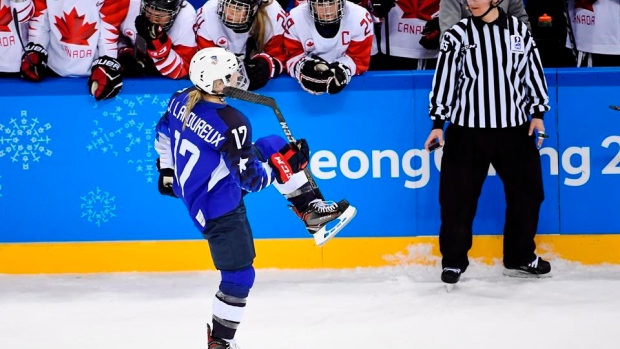Feb 22, 2018
NHL players disagree with shootouts deciding Olympic gold medal games
As thrilling as the Olympic women's hockey final was, it sparked yet more debate on settling gold medal games with a shootout. After Canada and the United States ended three periods plus a full 20-minute overtime tied 2-2, the Americans came out on top when Jocelyne Lamoureau-Davidson scored on a clever deke in the sixth round of the shootout at the Pyeongchang Winter Games.
The Canadian Press

As thrilling as the Olympic women's hockey final was, it sparked yet more debate on settling gold medal games with a shootout.
After Canada and the United States ended three periods plus a full 20-minute overtime tied 2-2, the Americans came out on top when Jocelyne Lamoureau-Davidson scored on a clever deke in the sixth round of the shootout at the Pyeongchang Winter Games.
Many fans, especially in Canada after the crushing defeat, would have liked them to play until someone scored, as they do in the National Hockey League playoffs. But it seems the shootout is a fixture in International Ice Hockey Federation rules.
"It's one of those things — good win for the team that wins and devastating for the team that loses in the gold medal game, no matter what," Toronto Maple Leafs and 2014 Canadian Olympic team coach Mike Babcock said Thursday. "I'm not a shootout guy.
"I don't get that at all. I don't know why you don't just keep playing, but they don't ask me about the rules so it doesn't much matter what I think."
The IIHF prefers to use the shootout at the Olympics and world championships partly because it limits how long games last, which is important when there are other games to play on the same ice later in the day. That is not the case for the tournament final, but it has chosen to keep the shootout anyway.
Tampa Bay Lightning star Steven Stamkos feels the IIHF should rethink the rule.
"It would be like a playoff game being decided by a shootout. It would be absolutely ridiculous," said Stamkos. "We'd all be complaining about that so why should a game, whether it be world juniors, world championship or Olympics, get decided by a shootout?
"Obviously it's a little tougher for Canadians. Not taking anything away from the Americans because they played a great game, but if you asked both teams before that game started if they wanted it decided in a shootout they probably would have said no, and maybe they should look into that."
It may be easier to swallow for players from Europe, who have a long history of seeing major soccer matches end in shootouts. But even some of them have reservations when it comes to a hockey tournament final
"I like the shootout," said Mats Zuccarello, the Norwegian forward for the New York Rangers. "It's fun for the fans, but maybe not in a gold medal game like that."
"Maybe in round robin, but in the final it should be continuous overtime, in my opinion. But it was an exciting shootout."
New York Islanders coach Doug Weight, an American, said he stayed up until 2:30 a.m. to watch the women's final and loved it despite the shootout.
"I was happy there was an end to it (for sleeping purposes), but it's tough," he said. "You have a 20-minute OT and the action in the third and overtime was just riveting.
"The shootout in the regular season brings the fans out of their seats, culminates the game, you can see some talent, (but it's) still not the best way to end it."
Henrik Lundqvist knows about shootouts. The Rangers goalie was in net as Sweden beat Canada on "game-winning shots," as the IIHF calls it, in the world championship final last May in Cologne, Germany.
"As a goalie, it feels pretty good because you play a big part in it," said Lundqvist. "In that format, a short tournament, I don't mind it.
"What's the alternative, keep on playing another two periods? I understand that's tough. But I wouldn't like the Stanley Cup playoffs to be decided in a shootout, that's for sure."
Canada's coach at the worlds was Tampa Bay bench boss Jon Cooper.
"We all know the rules going into it," said Cooper. "If you ask the Americans, they're probably saying it's OK if it goes that way.
"Take it from me and being on the wrong side at the World Championships, we knew what the rules were going in and we should have ended it in overtime and we didn't and it goes to a shootout and you never know."
However, Rangers forward Mika Zibanejad finds shootouts gripping.
"It's one on one," he said. "It's a lot of pressure to step up like that in a gold medal game.
"It's who has the nerve and who doesn't. I know a lot of people in that situation have said no, they don't want to take one. Maybe not everyone's made to do it."
Toronto forward James van Riemsdyk watched the 2014 women's Olympic final, which Canada won in overtime, when he was playing for the United States men's team in Sochi, Russia.
"Me and Phil (Kessel) went to a bunch of the games, including the gold medal one, which was a heartbreaker for (the Americans), so nice to see them get some redemption this time," said van Riemsdyk, who was impressed with Lamoureux-Davidson's game-winner.
"That was really nice. All the stuff actually that she did on that, that's stuff that we want to do too — come in on your off side and you have a couple different options there. She made a really nice move and was able to put it in."
— with files from Dhiren Mahiban in Toronto and Lisa Wallace in Ottawa
